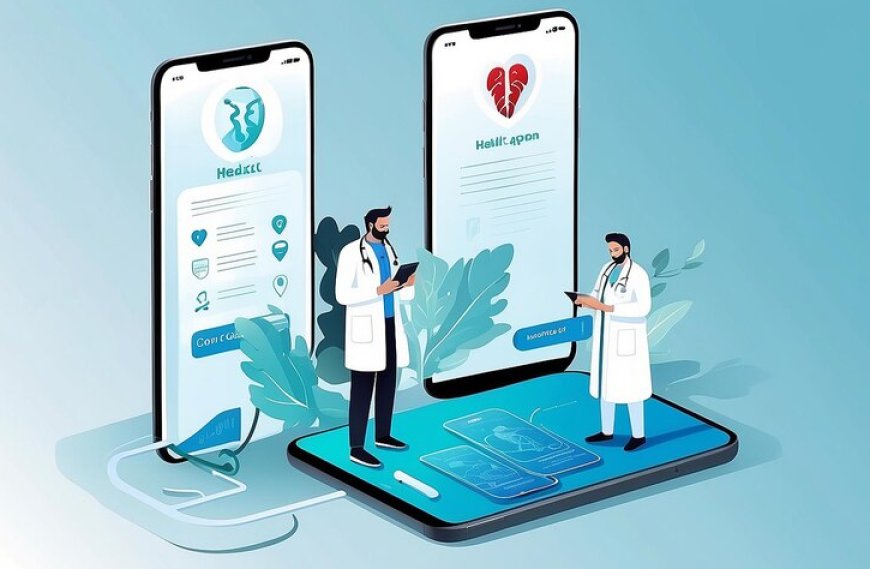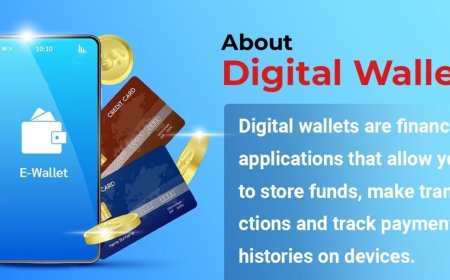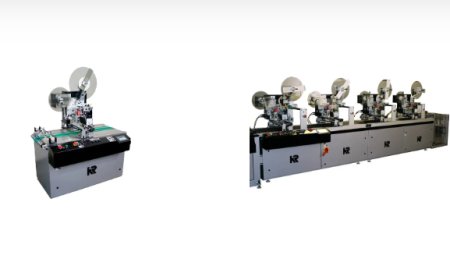9 Essential Steps to Build a Healthcare Mobile App
Discover the 9 essential steps to build a secure and user-friendly healthcare mobile app. Learn how top healthcare mobile app development companies and expert healthcare app developers ensure compliance, performance, and success in mobile healthcare app development.

The rapid evolution of mobile technology is transforming the healthcare industry. From virtual consultations to real-time health monitoring, mobile apps are playing a pivotal role in redefining patient care. However, building a secure, compliant, and user-centric healthcare mobile app requires a strategic development approach. In this article, we outline the 9 essential steps to successfully build a healthcare mobile app.
What Is a Healthcare App?
A healthcare app is a mobile software application created to help users take charge of their physical and mental well-being, or to assist healthcare professionals in delivering better care. These apps are part of the growing field of mobile healthcare app development, offering tools for everything from booking appointments to accessing electronic health records in real time.
For patients, healthcare apps provide a seamless way to track symptoms, consult doctors online, manage prescriptions, and maintain a healthier lifestyle. For healthcare providers, such apps reduce administrative burdens, streamline operations, and improve patient engagement and outcomes.
Top healthcare app developers integrate various services, security protocols, and intuitive UI/UX design to meet both regulatory and user expectations. These applications are often developed by a professional Healthcare Mobile App Development Company that understands the nuances of privacy compliance, scalability, and patient-centric design.
Types of Healthcare Apps
Healthcare apps come in a wide variety, each tailored to specific needs. Here are the most common types:
1. Telemedicine Apps
These apps allow patients to consult with doctors remotely via video calls, voice calls, or chat. It reduces hospital visits, especially for minor ailments, and increases access to care for people in remote areas.
2. Fitness and Wellness Apps
Used widely by the general public, these apps track steps, calories burned, water intake, sleep cycles, and even menstrual health. Integration with wearables like Fitbits and smartwatches makes them even more efficient.
3. Medication Reminder Apps
These apps remind users to take their medications on time, helping improve treatment adherence. Some also include refill alerts and dose tracking for long-term therapies.
4. Chronic Disease Management Apps
These applications help patients monitor long-term conditions such as diabetes, hypertension, asthma, and COPD. They offer features like daily logs, symptom tracking, alerts, and personalized treatment tips.
5. EHR/EMR Apps
Designed primarily for doctors and hospitals, these apps allow real-time access to patient records. Integration with hospital systems helps healthcare providers make quick, informed decisions without shuffling through paperwork.
Each type is a product of careful health application development, focusing on security, accessibility, and user engagement.
Key Features of a Successful Healthcare App
In the competitive landscape of mobile healthcare app development, having the right features can make or break your app. A well-built app should not only function efficiently but also offer users a smooth and secure experience.
1. Secure Sign-in & User Profiles
Authentication features like email/password, biometric login, and two-factor authentication help protect sensitive health data. User profiles can store medical history, allergies, appointments, and insurance information.
2. Online Appointment Scheduling
Users can check doctor availability, book appointments, reschedule visits, and even pay consultation fees within the app. This reduces call center burden and no-show rates.
3. In-app Chat and Video Consultation
Real-time communication via text or video improves access to healthcare, particularly for users who live far from clinics or during emergencies. It also saves time for both doctors and patients.
4. EHR Integration
Connecting the app to Electronic Health Records allows seamless data sharing between doctors and patients. This feature is crucial for diagnosis, treatment planning, and medical continuity.
5. Push Notifications & Medication Reminders
Push alerts keep users engaged and informed—whether it’s for appointment reminders, medication times, or health tips.
6. Real-time Symptom Tracking
This allows patients to log their daily health metrics and share them with their doctors, helping with remote monitoring and preventive care.
7. Secure Payment Gateways
Offering encrypted, HIPAA-compliant payment options within the app enhances user trust and simplifies billing for healthcare providers.
8. Compliance with HIPAA/GDPR
Any trustworthy Healthcare Mobile App Development Company ensures full compliance with healthcare data protection laws like HIPAA (USA) and GDPR (Europe), safeguarding user privacy and data integrity.
Core Services Offered by Healthcare Apps
Healthcare apps are not just digital notepads—they are powerful service platforms designed to enhance the overall healthcare journey. Here’s a breakdown of the core services typically offered:
1. 24/7 Teleconsultation
Users can instantly connect with general practitioners or specialists around the clock. This is particularly helpful for minor health concerns, mental health support, and follow-up consultations.
2. Health Monitoring through Wearables
Apps can integrate with wearables to monitor vital stats like heart rate, blood pressure, glucose levels, and oxygen saturation. This is a major advantage in proactive care and early disease detection.
3. Digital Prescriptions
After a virtual consultation, doctors can issue digital prescriptions that patients can use to buy medicines online or offline. It eliminates paper use and simplifies record-keeping.
4. Lab Test Bookings
Many healthcare apps offer the ability to schedule lab tests at home or nearby diagnostic centers. Users can also view reports and share them with healthcare professionals instantly.
5. Mental Health Therapy Sessions
With rising awareness about mental wellness, many apps now include access to licensed therapists and psychologists. Features include anonymous counseling, mindfulness sessions, and progress tracking.
6. Chronic Condition Support Programs
These include diet plans, exercise regimens, virtual coaching, symptom logs, and medication management specifically designed for conditions like hypertension, cancer, and arthritis.
9 Essential Steps to Build a Healthcare Mobile App
The healthcare industry has been rapidly adopting digital technologies, and mobile apps are at the forefront of this transformation. Healthcare mobile apps have become essential tools for patients, healthcare providers, and businesses, offering a variety of services such as telemedicine, health tracking, and appointment scheduling. If you're planning to build a healthcare mobile app, it’s crucial to understand the steps involved. In this article, we will walk you through the 9 essential steps to develop a healthcare mobile app, while highlighting important aspects such as the role of healthcare mobile app development companies and healthcare app developers.
1. Define the Purpose of Your Healthcare App
The first step in healthcare app development is to clearly define the purpose of your app. Are you looking to create a fitness tracker, a telemedicine app, or a medication reminder? Your app’s functionality should align with the specific needs of your target audience, whether it's patients, healthcare providers, or fitness enthusiasts. Understanding the problem you want to solve will shape the rest of the app development process.
2. Conduct Market Research
Market research is an essential part of healthcare application development. Before diving into development, it’s important to assess the competitive landscape, understand user needs, and identify any gaps in the market. This research will help you understand what features healthcare app users expect, as well as the design trends and potential regulatory hurdles you may face.
3. Identify Key Features and Functionality
Once you have a clear understanding of the app’s purpose and market demand, you can begin identifying the features you want to include in the app. Some common features of healthcare mobile apps include:
-
Telemedicine: Virtual consultations with healthcare professionals.
-
Appointment Scheduling: Enabling users to book appointments with doctors or clinics.
-
Medication Reminders: Reminding users to take their prescribed medication.
-
Health Tracking: Tracking fitness metrics, symptoms, or chronic conditions.
-
Secure Messaging: Allowing secure communication between patients and healthcare providers.
4. Choose the Right Technology Stack
Choosing the right technology stack is critical for the performance, scalability, and security of your healthcare app. Depending on the functionality and platform you wish to target (iOS, Android, or both), you will need to select appropriate frameworks and tools. For healthcare apps, ensuring data security and privacy is paramount, so you may want to consider technologies that adhere to health regulations like HIPAA in the U.S.
5. Ensure Compliance with Healthcare Regulations
Healthcare apps are subject to strict regulations, including HIPAA (Health Insurance Portability and Accountability Act) in the U.S. and GDPR (General Data Protection Regulation) in the European Union. When developing a healthcare app, it's essential to ensure that the app complies with these regulations to protect users’ personal health information (PHI) and avoid legal issues. Partnering with a healthcare app development company that has experience in compliance can help you navigate these requirements.
6. Design a User-Friendly Interface
The design of your healthcare app is critical to its success. A user-friendly interface ensures that your app is easy to navigate, making it accessible to users of all ages and technical abilities. Your design should focus on clarity, simplicity, and ease of use, particularly for seniors and patients with limited tech skills. Additionally, the app should be visually appealing and professional, as it will reflect the credibility of your healthcare brand.
7. Develop and Integrate Core Functionality
With the design and functionality defined, it’s time to start the development process. During this stage, your healthcare app developers will bring the concept to life by coding the app, integrating third-party APIs, and implementing all the necessary features. It’s essential to ensure that the app is optimized for performance and that all core features are thoroughly tested before moving on to the next stage.
8. Test the App for Quality Assurance
Testing is a crucial part of the healthcare app development process. A comprehensive QA process ensures that the app works smoothly, is bug-free, and provides an optimal user experience. Healthcare apps often handle sensitive data, so security testing is particularly important to protect against data breaches. Test the app on multiple devices, operating systems, and networks to ensure compatibility and reliability.
9. Launch and Post-Launch Support
Once your healthcare mobile app is tested and refined, it’s time to launch. Before going live, ensure that you have a marketing strategy in place to promote the app to your target audience. After launch, it’s important to provide ongoing support, updates, and feature improvements to keep users engaged and to address any issues that arise.
Conclusion
Building a healthcare mobile app is a complex but rewarding process that requires careful planning, execution, and compliance with healthcare regulations. By following these 9 essential steps and working with experienced healthcare mobile app development companies and healthcare app developers, you can create an app that meets the needs of both users and healthcare professionals. With the right approach, your healthcare app can contribute to improving patient care, streamlining healthcare services, and driving innovation in the healthcare industry.










































































